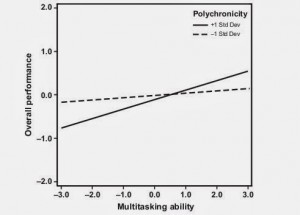The other week I reviewed The Rise of the Humans by Microsoft’s Dave Coplin. The first part of the book focuses on the deluge of information people are bombarded with at work, and the impact this has on our ability to perform well. As a narrative, it’s a well trodden one, and there have been numerous studies, books, tv shows and so on detailing the terrible impact our modern lives have on our ability to concentrate. Whether it’s the open plan office or 24/7 email or social media, there is a willing queue of distractions ready to derail our thoughts.
Alas, a good deal of the research into multitasking has focused on when the switching has been forced upon us. The picture is slightly less clear cut when we actively choose to go about our business in a multitasking kinda way.
For instance, what if multitasking is done in order to get the most done in the least time, or if people believe their brain power could be put to better use?
A recent study from researchers at the University of Groningen set to find out. They designed a study whereby participants freely chose when to interrupt their work on a particular task.
The results are fascinating, and show that there were particular prompts that encouraged people to multitask. For instance, delays in a task would often tempt participants to switch to another, even when the original task required them to store information in their memory.
Interestingly however, the levels of multitasking seemed to have little learning built into it. Whilst with many other things, the more we do them, the better we get, where multitasking was concerned, this wasn’t found to be the case.
These results suggest that, despite what we may think, we don’t necessarily make optimal choices when it comes to multitasking: People will switch tasks simply because they have the resources to do so, and they will seek greater efficiency in a secondary task even if it worsens their overall performance the long run.
Whilst we may not be making the most optimal choices with our focus of attention, previous studies have shown that our attitude towards multitasking is important to how good we are at it. One study found that when people stated a strong preference for multitasking, their ability to do so well went up accordingly. The graph below shows that even when people stated they liked to multitask, if they weren’t very good at it, this wasn’t enough to compensate and deliver strong performance.
There were similar findings in a study that explored how we respond to interruptions at work. It found that the key to success was in ones mental approach to interruptions. If we didn’t let them bother us, we regained focus much faster. This latest study suggests however that willpower alone is not enough to deliver good performance.
It is a well trodden saying that we should hire for attitude and train for skill. Maybe in our interruption riddled world, that really should be the case.
